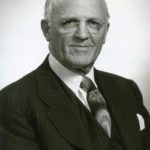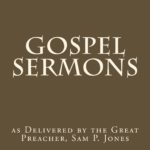Description
The Secret of Christian Joy
By
VANCE HAVNER
Author of “By the Still Waters”
PREFACE
IN this day of the making of many books one hesitates to add another volume to the number. We have been encouraged, however, by the readers of these sermon-articles as they appeared in various magazines to collect them in permanent form. So we send them forth again with the earnest desire that they may glorify Him Who loved us and gave Himself for us.
Grateful acknowledgment is made for the kind permission granted by several magazines for the reprinting of the following:
To Revelation, Philadelphia, Pennsylvania, and and-Waiting (now included in Revelation) for “Old Time Religion,” “The Secret of Christian Joy,” “Revive Us Again,” “The Foolishness of God,” and “Is It Nothing to You?”
To Moody Monthly, Chicago, Illinois, for “The Heavenly Vision.”
To King’s Business, Los Angeles, California, for ‘Let God Be True,” “Learning, Living, Looking,” and “He Is Beside Himself.”
- H.
Charleston, S. C.
1 THE SECRET OF CHRISTIAN JOY
THE Church suffers today from a saddening lack of old-fashioned, simple-hearted, overflowing, Christian joy. We have plenty of knowledge, plenty of enthusiasm and denominational zeal, but Christians and churches that started out in revival fires are living in the smoke, and the “amens” and “hallelujahs” have gone from most assemblies of the saints.
When one recalls that we are to rejoice in the Lord always —and then looks in on the average Sunday congregation, he realizes that something has happened to us since Pentecost. We meet on the Lord’s day more as though we had assembled to mourn a defeat than to celebrate a victory.
Although the New Testament centers in a cross and is bathed in the blood of martyrs and blackened by the fires of persecution, its note from beginning to end is one of triumphant joy. It begins with an angel chorus and ends with rejoicing around the throne of God. The Gospel means “good news.” Our Lord’s characteristic greeting was, “Be of good cheer.” He gave us “three cheers”: the cheer of forgiveness, “Be of good cheer, thy be forgiven thee (Matthew 9: 2); the cheer of companionship, “Be of good cheer: it is I; be not afraid” (Mark 6: 50); the cheer of victory, “Be of good cheer; I have overcome the world” (John 16: 33). He invited us to a feast, not to a funeral. He said,“If ye know these things, happy are ye if ye do them” and He intended that His joy should remain in us and that our joy should be full.
When we enter the life of the early Church, we find them eating their meat with gladness and singleness of heart, praising God. We follow Paul from prison to prison, but his shout is, “Rejoice in the Lord alway; and again I say, Rejoice” Evidently emotion had not been outlawed among the saints in those days. Today the same church member who yells like a Comanche Indian at a football game sits like a wooden Indian in the house of God on Sunday. When David danced before the returning ark his wife despised him and was smitten with barrenness. Today happy Christians are frowned upon by those dismal souls who thus proclaim their spiritual barrenness. In the temple Pharisees complained because the children cried their “hosannas” around the Saviour (Matthew 21: 12-16). Hilarious, child-hearted Christians have always brought down the scorn of those who measure piety by the length of the face.
Sometimes one thinks the text most suitable for a sermon to the average church congregation would be Galatians 4:15: “Where is then the blessedness ye spake of?” If we were absolutely truthful, would we not have to sing as our experience?—
“Where is the blessedness I knew
When first I saw the Lord?
Where is the soul-refreshing view
Of Jesus and His Word?
What peaceful hours I then enjoyed!
How sweet their memory still!
But they have left an aching void
This world can never fill.”
In John 20: 20 we read: “Then were the disciples glad, when they saw the Lord” Here we have the secret of Christian joy: it turns upon those two words, “then” and “when.” We are glad when we see the Lord.
It does not read, “Then were the disciples glad when they saw themselves.” When we see the Lord we see ourselves, but what we see is not very complimentary. Job saw the Lord and abhorred himself. Daniel saw the Lord and his comeliness was turned to corruption. Isaiah saw the Lord and cried, “Woe is me!” Habakkuk saw the Lord and his body trembled and rottenness entered his bones. Saul of Tarsus fell in the dust and John fell at the feet of the Lord as one dead. Some of us do not see the Lord because we are looking at ourselves, and so doing we are never glad.
You will observe, next, that our verse does not say, “Then were the disciples glad when they saw each other.” Looking at other Christians is a most disappointing business. Peter always is tempted to wonder about John and needs the Lord’s stem word, “What is that to thee? Follow me yourself.” We read in I John 5: 16: “If any man see his brother sin a sin which is not unto death, he shall ask, and he shall give him life for them that sin not unto death.” Our brother’s sin is not a challenge to criticism but a call to prayer. When Christians begin to watch each other they do not see the Lord.
Nor were these disciples glad when they saw their circumstances. Their circumstances were not very encouraging, with the doors shut for fear of the Jews. All through the Word we find God’s men grieved over circumstances, but when they see the Lord they rejoice (Psalm 41:4-13; Lamentations 5: 19-22; Micah 7: 1-7). Consider Habakkuk. He was perplexed over the prosperity of the wicked and the sufferings of the righteous. God did not explain this, but when Habakkuk saw the Lord he could say,“Whatever the circumstances, I will joy in the God of my salvation” Then was Habakkuk glad when he saw the Lord.
We do not even read that the disciples were glad when they saw a particular doctrine about the Lord. It is possible to know many things about the Lord without seeing Him. Believers go off at tangents and perch on favourite spokes of the wheel of truth, instead of standing at the hub. Some see only the work of the Spirit, forgetting that the Spirit testifies of Christ. Some look to the Lord’s return with an academic interest in an event rather than a joyful expectation of a Person. Others harp on the abundant or victorious life (which is simply Christ in the believer) in a fashion which often sees a life more than it sees the Lord.
In a day when false Christs are being preached it is well to notice that this Christ Who brought such joy to His disciples was a crucified Christ, bearing the marks of the Cross, “wounded for our transgressions and bruised for our iniquities” Enemies of the Cross of Christ would ridicule the Blood and cover His hands and side, but we are truly glad only when we see the crucified Lord.
But He was also a risen Lord. Christ crucified is not enough. If He rose not, our preaching is vain, we are yet in our sins and of all men most miserable. And how many Christians there are who claim to be dead with Christ, but who are not living in the power of His Resurrection!
Now consider what a change our Lord wrought when He appeared. He found the disciples huddled in a room with the doors shut for fear (John 20:19). Hundreds of believers live today behind closed doors of dread and uncertainty. They are afraid of life and of death, of the devil, of criticism, of circumstances, afraid of today and tomorrow, imprisoned in fear, doubt and worry. They need to see the Lord.
First, our Lord brought assurance: He established before the disciples the fact of His resurrection. The report of it had seemed too good to be true. Several times in the Word we read of the people believing not for joy: Jacob about Joseph (Genesis 45:26), the disciples at our Lord’s appearance (Luke 24:41), and Rhoda at the deliverance of Peter (Acts 12:14). Somewhere I have read of a little tenement child, accustomed to sharing one glass of milk with several others, being given a large glass of milk in a hospital. Clutching it eagerly, the little fellow asked, “Please, nurse, how deep may I drink?” Often the good things of God seem almost too good to be true. And how wonderful is the Divine mathematics that all things are for me and yet all things are for you! I am sure I could not divide a thousand dollars among a multitude so that each would receive a thousand dollars. But the grace of God is in no wise diminished by sharing, it is all for each!
So our Lord brings assurance, as if to say, “Yes, I am really alive, there is no mistake. And because I live, ye shall live also.” If on any point you lack assurance, it is because you are not seeing the Lord. “Be not faithless, but believing.”
Then He brought joy. He had promised, “I will see you again, and your heart shall rejoice, and your joy no man taketh from you” (John 16:22). This joy of the Lord is a full joy, not partial; it is a remaining joy, not a fleeting emotion that comes and goes; and no one may take it from us. That is our Lord’s answer to those poor souls who are always asking, “Yes, but will it last?” We are glad when we see the Lord, and the measure of our joy is in proportion to our faith by which we look unto Jesus. There is nothing fanciful and hit-or-miss about it. As we look unto Him we are lightened and our faces are not ashamed.
Our Lord also brought to these disciples a commission:
“As my Father hath sent me, even so send I you” The joy of the Lord is not merely for personal enjoyment, He gives to us freely that we may freely give. God gives us the joy of salvation, expecting that then we will teach transgressors His ways. After Peter was converted, he was to strengthen the brethren and feed the sheep. After we see the fair King, we should see the far country of service in His Name. Judson saw the Lord—and he saw Burma. Hudson Taylor saw the Lord—and he saw China. Moody saw the Lord—and he saw a lost world. After Saul asked, “Who art thou, Lord?” he asked, “What wilt thou have me to do?” After the vision comes the venture. As our Lord was sent forth, so sends He us.
Next, our Lord brought to the disciples power: “He breathed on them, and saith unto them, Receive ye the Holy Ghost” Whatever interpretation you put upon that, there is a bequeathing of power. There would be no use in giving joy if there were no power to sustain it, no use in giving a commission if there were no power to carry it through. After David prayed, “Restore unto me the joy of thy salvation,” he was careful to add, “Uphold me with thy free spirit.”
And He also gave them authority: “Whose soever sins ye remit, they are remitted unto them; and whose soever sins ye retain, they are retained” However you explain this, it is evident that great authority is here delegated. If we saw the Lord, we would speak with authority and not as the scribes. We see sermon helps and commentaries but not the Lord, and there is no note of heavenly unction. Here many a timid Timothy will find the cure for pulpit bashfulness: “They looked unto him, and were lightened, AND THEIR FACES WERE NOT ASHAMED” Of course, there is a false courage, a brazen bravado which enters the pulpit with head thrown back, like Napoleon crossing the Alps. He who sees the Lord speaks with heavenly authority, not his own.
But perhaps someone complains: “Ah, yes, I know that seeing the Lord Jesus brings all these benefits, but, alas, He does not appear now as He did then so that we actually may see Him.” That is why the Holy Spirit follows this account in John 20 with the record of doubting Thomas. He knew there would be Thomases through the ages who must see to believe. Has it ever occurred to you that you and I who see Him not as the disciples saw Him have a greater blessing declared from His own lips:“Blessed are they that have not seen, and yet have believed”? Though now we see Him not, yet believing, we rejoice with joy unspeakable and full of glory.
We are glad only when and as we see the Lord. It is according to our faith, as looking unto Jesus we see no man save Jesus only. There are many things that we see NOT YET—“we see not yet all things put under him, but we see Jesus.” And one day, when we see no longer through a glass as in a riddle, we shall see Him as He is. His servants shall serve Him and shall see His face.
A minister who was failing to preach Christ found a note in the pulpit Bible one Sunday morning. It read, “Sir, we would see Jesus.” Convicted, he began to hold up the Lord in his messages. Some time later he found another note in the Bible reading, “Then were the disciples glad when they saw the Lord.”
It is the supreme need of the hour that believers should look away from all else, much of which may be good, and see only the Lord. Then shall we have fresh assurance and joy, we shall receive a new commission, with power and authority to carry it out. Robertson of Brighton, discouraged, once offered in prayer to resign his commission to preach. The Lord answered that what he needed was not to resign it, but to have it re-signed with Divine power and approval.
Remember that you cannot reach the “THEN” of our text without first coming to the “WHEN.” “THEN were the disciples glad WHEN they saw the Lord”





Reviews
There are no reviews yet.